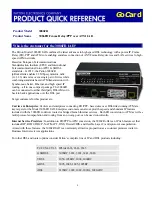
You have two commands to configure a stub area:
stub
,
defaulted-cost
. You need to use the
stub
command on routers connected to a stub area to configure the area as stub.
If multiple OSPFv3 processes are running, use of this command takes effect only for the current
process.
Related commands:
stub
.
Examples
# Configure Area 1 as a stub area, and specify the cost of the default route advertised to the stub
area as 60.
<Sysname> system-view
[Sysname] ospfv3
[Sysname-ospfv3-1] area 1
[Sysname-ospfv3-1-area-0.0.0.1] stub
[Sysname-ospfv3-1-area-0.0.0.1] default-cost 60
default-route-advertise
Syntax
default-route-advertise
[
always
|
cost
value
|
route-policy
route-policy-name
|
type
type
] *
undo default-route-advertise
View
OSPFv3 view
Default level
2: System level
Parameters
always
: Generates a default route in an ASE LSA into the OSPF routing domain regardless of
whether the default route exists in the routing table. Without this keyword, the command can
distribute a default route in a Type-5 LSA into the OSPF routing domain only when the default route
exists in the routing table.
cost
value
: Specifies a cost for the default route, in the range of 1 to 16777214. The default is 1.
route-policy
route-policy-name
: Specifies a routing policy, a case-sensitive string of 1 to 63
characters.
type type
: Specifies a type for the ASE LSA: 1 or 2. The default is 2.
Description
Use
default-route-advertise
to generate a default route into the OSPF routing domain.
Use
undo default-route-advertise
to disable OSPF from redistributing a default route.
By default, no default route is redistributed.
Using the
import-route
command cannot redistribute a default route. To do so, you need to use the
default-route-advertise
command. If no default route exists in the router's routing table, use the
default-route-advertise always
command to generate a default route in a Type-5 LSA.
You can reference a routing policy to set the cost and type of the default route:
•
The router advertises the default route only when it passes the routing policy.
•
The default route passing the routing policy uses the cost set by the
apply cost
clause, and the
type set by the
apply cost-type
clause in the routing policy.
287
















































